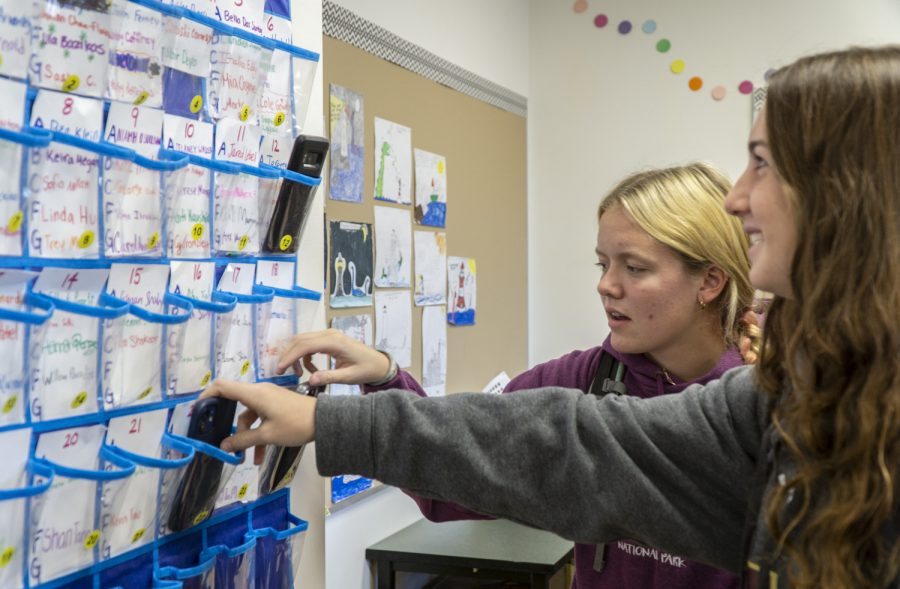New school year brings stricter phone, technology policies
Junior Lizzie Connolly and senior Ava Conigliaro place their cell phones in a phone holder in English Teacher Deborah Saltzman’s classroom.
November 21, 2022
With the 2022-23 school year in full swing, students and staff are becoming accustomed to an overall stricter attitude regarding the use of electronics, namely cell phones and earbuds, during school hours.
At the beginning of the term, Algonquin students gathered at their respective class meetings for a presentation outlining several updates and reminders regarding school policy. These include the prohibition of headphones in the hallways while class is in session, regulation of phone use based on each individual teacher, as well as newly implemented consequences for a repeated offense.
Principal Sean Bevan believes that while technology can be beneficial in some instances, these reminders of existing policy contribute to the overall quality of students’ education.
“The boundary for when the use of technology was appropriate and when it was impeding [students’] learning was getting blurred,” Bevan said. “We’re trying to create more clarity around those boundaries, with the goal simply being about teaching and learning.”
During previous years, existing policies regarding phone use were seldom enforced on the administrative level, instead being dictated by teachers. Students were often able to use their devices freely in class, including listening to music through headphones. Bevan links the dependence on these devices to the COVID-19 pandemic, a time in which technology was the only way of staying connected with peers.
“Coming out of the pandemic, students had this understandable reliance on technology, having spent two years apart from each other,” Bevan said. “We want to try to signal to them that there are good, safe, appropriate places for [using technology].”
Bevan shared the results of an informal survey he gave teachers at the beginning of the school year, asking about the impact of cell phone and headphone usage in their classrooms during the 2021-22 school year. Responding using a one to six scale, of the 87 respondents, 38% selected “six,” indicating the problem was “very large” with only 5% selecting “one,” indicating phones and headphones were “no problem at all, students only use them with my permission.” Five percent of teachers rated classroom use of phones as a “two,” 10% as a “three,” 22% as a “four” and 21% as a “five.”
According to the Student Handbook, cell phone usage is permitted only during unstructured periods, such as passing time and lunch, and during class time if explicitly instructed by an adult. By putting an emphasis on staying focused in class, Bevan hopes the learning experience will be smoother and more effective for both students and teachers.
“Every teacher is using some type of strategy,” Bevan said. “There’s very few, if any, earbuds during instruction, which last year I saw quite a bit of.”
This re-definition of existing policy originated in widespread concern among teachers about the level of attention spent on phones during class, rather than all focus being on the lesson. Like Bevan, English teacher Emily Philbin noticed the issue became more prevalent during and directly after the period of remote learning.
“The teachers were really frustrated by the phone use the past few years,” Philbin said. “Our shift to more technology [since the pandemic] has led to more distractions.”
After experiencing the phone use epidemic firsthand, Philbin came to a simple solution for how to eliminate any potential distraction in her classes.
“I had decided before we even had a meeting that this year, I was going device-free with all my classes,” Philbin said.
Philbin believes mutual respect is critical in the student-teacher relationship. She asserts that in order to fulfill her role as an instructor, it is essential that each student value the time they spend together in class.
“I used to just ignore the phone, and [hope] it goes okay, but it also bothers me,” Philbin said. “It’s my job to make sure that you are getting this information–there’s responsibility on both sides.”
When it comes to listening to music during class, Philbin sees it as a useful tool only when blocking out noise in order to focus. She cites research on the topic to emphasize the impossibility of internalizing a lesson while listening to music.
“What’s important for students to realize is that your brain is processing language,” Philbin said. “If I’m talking to you and you’re listening to something, your brain has to choose what to [process].”
Bevan surveyed teachers again on Oct. 17 about cell phone and headphone usage in their classrooms. Using the same scale of one to six, of the 83 respondents, 2% selected “six,” indicating the problem was “very large,” and 10% selected “one,” indicating phones and headphones were “no problem at all, students only use them with my permission.” Forty-one percent of teachers rated classroom use of phones as a “two,” 25% as a “three,” 17% as a “four” and 5% as a “five.”
Although the survey results indicate that most teachers have experienced positive changes in their classrooms due to the reinforced policies, some returning Algonquin students had difficulty adjusting to a new environment. Having attended the school before the COVID-19 pandemic, senior Hannah Albers observed that the rules for phone usage this year are the most strict she has experienced so far.
“Specifically this year, I’ve noticed a lot more teachers have brought up cell phones, teachers that I’d had in the past that wouldn’t really mind,” Albers said. “More teachers have been enforcing rules [regarding phone use].”
Albers understands the purpose of the reinforced policies, but simultaneously believes that they set unrealistic precedents for her future education. She points out that members of the senior class should be prepared to make their own academic decisions, should they choose to attend college.
“Having the option of your phone being out gives you a responsibility,” Albers said. “No professor is going to take your phone away.”
Junior Patrick Biamou has a similar opinion when it comes to the responsibility of high school students, many of whom are close to adulthood, in relation to the use of headphones.
“I think it should be a student’s choice… because it’s our education,” Biamou said. “I feel like I’m more present when I’m listening to music; it keeps me awake.”
The regulation of technology and the effort to eliminate classroom distractions continues to affect all members of the community. Given the approaches taken by administrators and teachers going into the 2022-23 school year, students should be prepared for these policies to be maintained for the duration of their high school career.
“Our short-term goal this year is to primarily communicate to students that the idea of being present is really important,” Bevan said. “That when they’re in class, they’re really present; they’re not using earbuds or cell phones.”












